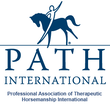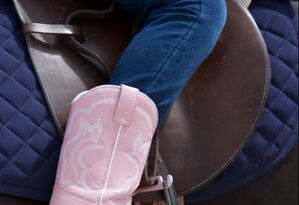 Hippotherapy offers a lasting, positive impact on children with cerebral palsy. Children who suffer from the frequent spasms and muscle tensing that come with spastic diplegia cerebral palsy can be helped with hippotherapy, according to research sponsored by the Horses and Humans Research Foundation (HHRF). What is even better is that those positive changes can last for months after hippotherapy treatments end! The initial question was whether hippotherapy could improve head/trunk stability and upper extremity function in children with spastic diplegia cerebral palsy. The study was conducted by researchers at the Washington University School of Medicine’s Program in Occupational Therapy. The researchers looked at the ability of the children to keep the head and upper trunk relatively still while the pelvis was in rhythmic motion. It was found that hippotherapy improved dynamic stability and head control in the children with cerebral palsy. The children also performed better when tested on touching a target when seated on a stool. Perhaps one of the most astounding parts of this research was that the significant changes in all of those studied areas were maintained for 12 weeks after the hippotherapy ceased. The persistence of those positive changes—even when the child with cerebral palsy was no longer receiving hippotherapy treatment—suggests that the motor control improvements learned on a horse might serve as a foundation upon which to build improved functional skills in other aspects of the child’s life. You can learn more about the Horses and Humans Research Foundation (HHRF) and support ongoing research by visiting HorsesandHumans.org. The mission of the Horses and Humans Research Foundation is to provide scientific research that explores the claimed—but as-yet scientifically unsubstantiated—benefits of equine-assisted activities and therapies. Original article was published in EQUUS Magazine by Kimberly S. Brown. Contact Positive Strides to learn more about our Hippotherapy program.
4 Comments
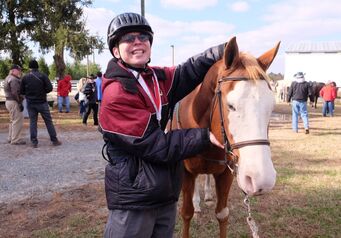 Positive Strides will host the Jaime Lee Hutchison Memorial Horse Show on Saturday, June 8, 2019 starting at 9:00 a.m. at Timber Grove Farm, 6292 Statum Road in Preston, Maryland. “We will be showcasing the wonderful work our riders have accomplished during the Spring Session,” said Kim Hopkins, executive director of Positive Strides. “They begin each six-week session with specific goals and we do our best to help them achieve them.” Riders will compete in a trail class and a barrel race. A recognition ceremony will be held at noon. The public is invited to attend free of charge. Donations are welcomed and appreciated. Food will be available for purchase on site. The series is held in loving memory of Jaime Lee Hutchison who tragically lost her battle with cancer in 2017. Pictured: A happy competitor and his horse after the medal ceremony last fall. 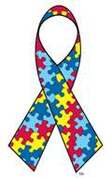 We've seen the positive results of using therapeutic riding to improve the lives of people with autism spectrum disorder (ASD). A recent study by a research team at Slipper Rock University is helping assign empirical evidence to the value of therapeutic riding and equine-assisted activities in reducing stress levels of adolescents with ASD. The following is an excerpt from an article on their findings. "We are thrilled with the results of this study," said Pam Cusick, board president of Horses and Humans Research Foundation, a nonprofit, non-endowed foundation that awarded the SRU research team $88,000 to conduct the study. "Adolescents with autism spectrum disorder report high stress and anxiety levels that impact functioning in the community. We are pleased to see confirmation that therapeutic riding has a positive impact on stress levels and hope that this research will encourage more adolescents with autism to consider therapeutic riding as an option." Also making the study possible were contributions from the research team that included three coinvestigators, Deborah Hutchins, associate professor of parks, conservation and recreational therapy; Courtney Gramlich, manager of the Storm Harbor Equestrian Center; and Steffanie Burk, an equine scientist at Otterbein University. In addition to collecting saliva and heart rate results from humans in the study, samples and data from horses were also collected to detect correlations. "The research is important to see the true effects that therapeutic riding can have," Gramlich said. "This could help programs like ours across the country. We've been getting phone calls from people reading about the benefits that we saw from the research and they are asking questions and wanting to do similar things. We say riding gives you so many great benefits but until we have measurable results that we can document, (people) won't 100-percent believe it." To learn how Positive Strides helps people with ASD and other specific diagnoses, see our Hippotherapy brochure or visit our Services page. Pictured: April is National Autism Awareness Month. The Puzzle Ribbon is the most recognized symbol of the autism community in the world. |
Kim and Ashley HopkinsThe latest news and insights from our executive director, board of directors and industry experts. Archives
August 2023
Categories
All
|
© 2023 Positive Strides, Inc.
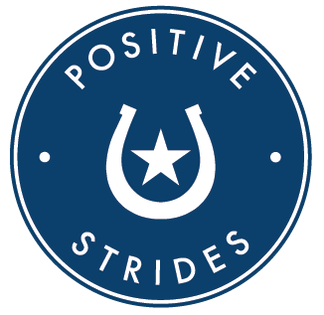
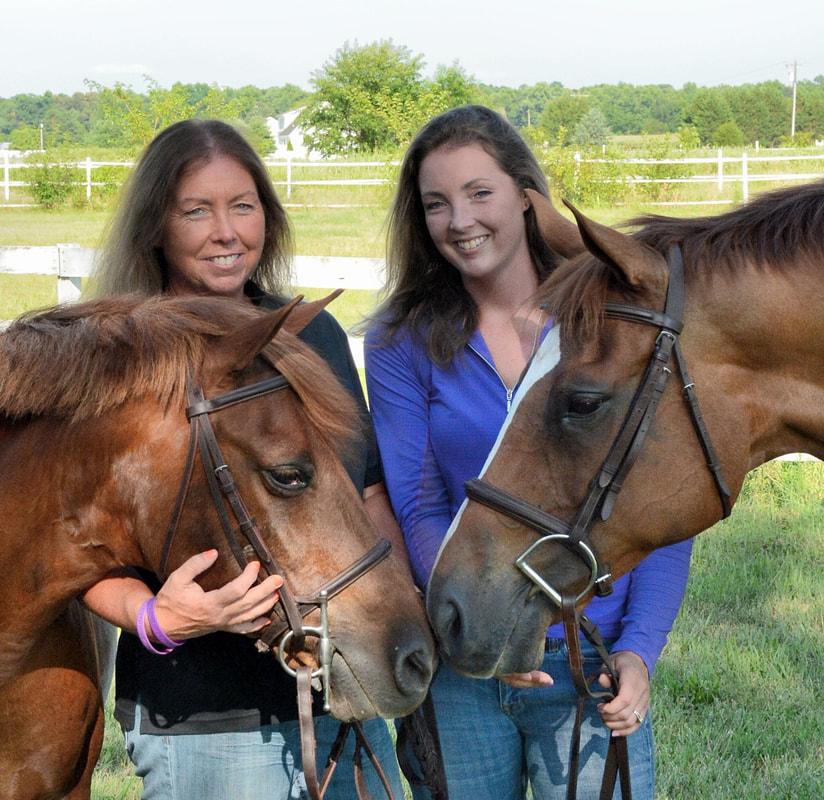
 RSS Feed
RSS Feed
